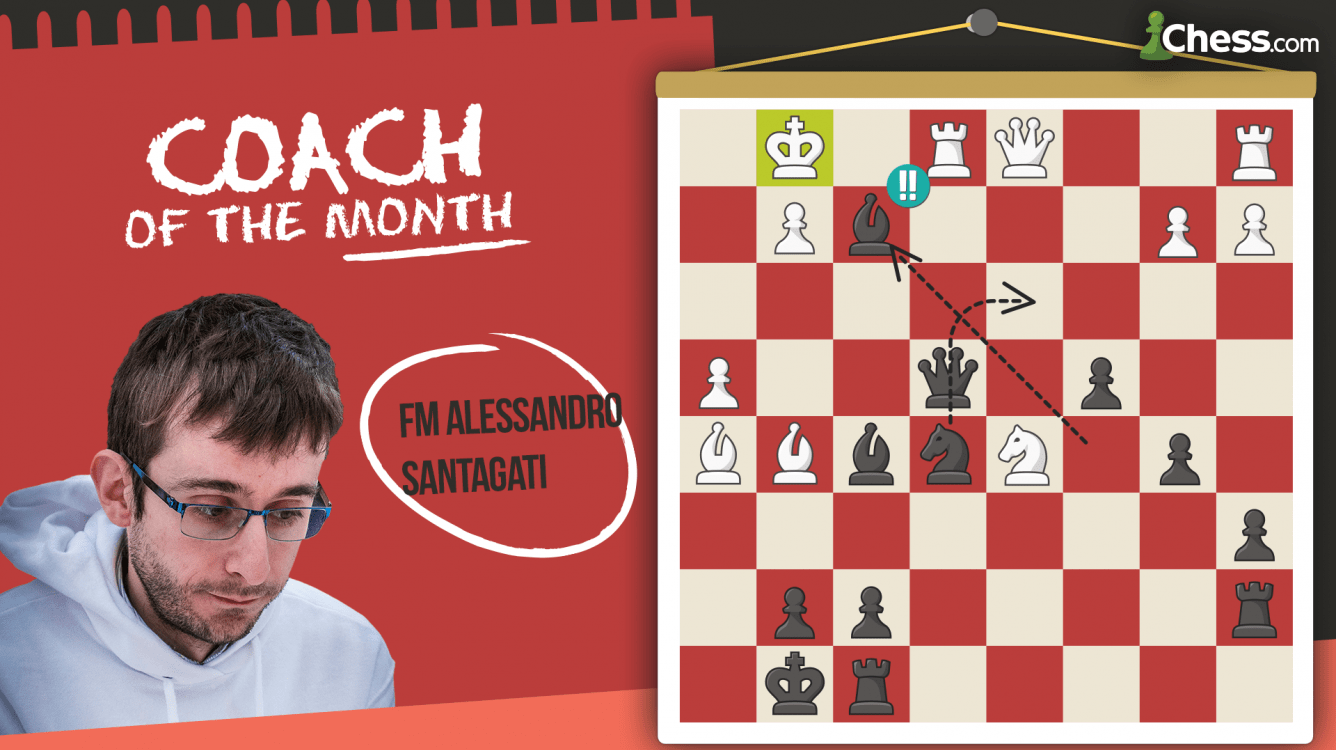
Coach Of The Month: FM Alessandro Santagati
Chess.com's latest Coach of the Month is FM Alessandro Santagati! A skilled coach with more than 10 years of teaching experience, Santagati prides himself on giving each student exactly what they need to succeed. Read on to learn more about this enthusiastic Italian FM.
Readers seeking private instruction can contact Alessandro Santagati via his Chess.com profile and can find other skilled coaches at Chess.com/coaches.
At what age were you introduced to chess, and who introduced you?
I started my chess journey at the age of 11 when I played in a tournament at my school. It was a tournament for players under the age of 16; I won three games in a row, all using scholar's mate! I then lost all the other games, finishing with three points out of seven games.
What is your first vivid memory from chess?
In the beginning, chess looked pretty complex. I remember not wanting to give up because it was an exciting challenge for me. When I was 13, I lost a lot of games in the tournaments I played. At age 14, I played a tournament for players rated under 2000. Despite the fact that my rating was 1452 at the time, I got very close to winning and ended up finishing third. This was something that definitely motivated me a lot.

Which coaches were helpful to you in your chess career, and what was the most useful knowledge they imparted to you?
I think I learned a lot from different people. When I was a child, local coaches helped me appreciate the study of the classics like Jose Raul Capablanca. As an adult, I had some private sessions with two really good grandmasters, Jan Werle and Andrey Sumets. They helped me to improve my positional understanding, as well as my opening knowledge.
Which game do you consider your "Magnus Opus?"
GM Jan Werle is probably the best player I beat in my chess career. I like this game because my approach was very cautious. At the same time, I was trying to create some counterplay at the right moment. It worked.
How would you describe your approach to chess coaching?
My approach as a coach is to really listen to my students. I work mainly with one-on-one lessons, and it's essential to understand the person's individual skills and goals. I take a look at their games to explore their weaknesses, and I prepare customized material to solve their main problems.

What do you consider your responsibility as a coach and which responsibilities fall on your student?
My responsibility is to create a tailored plan for each student, and to give them all the tools available to help them understand some key concepts to improve their chess games. After that, it is up to the student to stay motivated and follow the program.
What is a piece of advice that you give your students that you think more chess players could benefit from?
Playing chess, especially if you play good chess, can help you tremendously in developing a good thinking process that is going to be helpful in every aspect of your daily life.
What is your favorite teaching game that users might not have seen?
I really like this game, as it clearly shows the basic principles behind a good attack. To create a good attack, it's necessary to have certain conditions, especially when we are talking about attacking the king.
It's very important to have good control with the pawns and enough pieces to support the pressure because, very often, it's necessary to sacrifice. The other two important elements are open lines that can help the pieces to attack better, and the weaknesses of the enemy squares or pawns.
A good attack is a step-by-step process: you make a threat, and your opponent could stop it—but it might cause a weakness. Eventually, they have too many weaknesses, and you can break the enemy's position.

What is the puzzle you give students that tells you the most about how they think?
A common problem for beginners and intermediate chess players is that they play with no strategy. Very often, I'll show this position to them and ask them a couple of questions. What is their plan in this position? Which elements of the position do they consider when coming up with their plan?

Do you prefer to teach online or offline? What do you think is different about teaching online?
I prefer to teach online—it's my main job. I think online one-on-one lessons are the best choice. It's faster to set the chessboard, easier to load the material I prepared, and you can record the lesson.
What do you consider the most valuable training tool that the internet provides?
I really like Chess.com's analysis board and Puzzles. I've found classical puzzles to be very useful for myself; I think it's very important to work on difficult positions slowly without rushing.
Which under-appreciated chess book should every chess player read?
Interesting question. I'm not sure if it's under-appreciated, but I'd say Emanuel Lasker's Manual of Chess. Lasker is one of the stronger and longer-lasting chess players in the history of the game, and this book covers all of the most important key elements of chess strategy.
Are you a chess coach who's looking to find new students, build your brand, and get paid more for the work that you're already doing? Check out Chess.com's Coach Affiliate Program.
Previous Coaches of the Month:
- FM Amir Hadzovic
- WFM Fruzsina Szente-Varga
- WIM Tijana Blagojevic
- Charlie Rosado
- GM Swapnil Dhopade
- IM Alberto Chueca
- Frank Johnson
- WGM Keti Tsatsalashvili
- IM Kostya Kavutskiy
- GM Arturs Neiksans
- NM James Canty III
- IM Levy Rozman
- CM Gabor Horvath
- Colin Stapczynski
- NM Bojan Lukajic
- IM Mateusz Bobula
- IM Attila Turzo
- GM Max Illingworth


